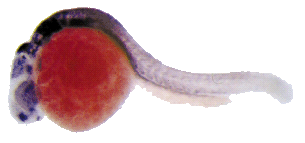Title
- Interim Director, The Honors College
- Associate Professor and Assistant Chairperson - Undergraduate Education, Department of Biology
Education
- Education: Ph.D. University of Ottawa
 My research interests lie in studying gene and genome evolution in the context of embryonic development. I am primarily interested in understanding how the proper spatial and temporal patterns of expression of transcription factors are controlled during embryonic development and how these control mechanisms evolved following gene or genome duplications.
My research interests lie in studying gene and genome evolution in the context of embryonic development. I am primarily interested in understanding how the proper spatial and temporal patterns of expression of transcription factors are controlled during embryonic development and how these control mechanisms evolved following gene or genome duplications.
The focus of my research is on the family of transcription factors encoded by homeobox-containing genes, specifically the Meis group of genes. The Meis genes are an evolutionarily well-conserved group of homeobox genes. Vertebrates contain at least three different Meis genes that arose from a single ancestral gene as a result of gene and/or genome duplications. The roles of the Meis gene products are known to include interacting with other homeodomain proteins to facilitate DNA-binding and transcriptional regulation.
Using the zebrafish as a model system, I am investigating the regulatory mechanisms that control Meis gene expression during development. I am also interested in examining the interactions between Meis and other homeobox-containing genes in terms of their combined role in development. My main goal is to use these studies to gain a better understanding of how the Meis genes have evolved and, in general, how selection maintains genes following a gene or genome duplication event. The zebrafish provides an interesting avenue to investigate this because, at some point after the divergence of the tetrapod lineage, the lineage that gave rise to the zebrafish underwent an additional genome duplication. Because of this, the zebrafish has a larger complement of certain genes, including the Meis genes, when compared to tetrapods such as mammals. This provides an excellent opportunity to gain a better understanding of how genes evolve by comparing the Meis genes in zebrafish and mammals such as mice, as it appears two zebrafish paralagous genes exist, for each mouse orthologue.
Selected Publications
- Zerucha, T. (2004) Your Body: How it Works: Human Development. Chelsea House Publishers, Broomall , PA.
- Yu, G., Zerucha, T. , Ekker, M., Rubenstein, J.L.R. (2001) Evidence that GRIP, a PDZ-domain protein which is expressed in the embryonic forebrain, co-activates transcription with DLX homeodomain proteins. Brain Research - Developmental Brain Research, Vol. 130, p. 217-230.
- Zerucha, T. and Prince, V.E. (2001) Cloning and developmental expression of a zebrafish meis2 homeobox gene. Mechanisms of Development, Vol. 102, p. 247-250.
- Zerucha, T. and Ekker, M. (2000) Distal-less -related homeobox genes of vertebrates: evolution, function and regulation. Biochemistry and Cell Biology, Vol. 78(5), p. 593-601.
- Quint, E., Zerucha, T. , and Ekker, M. (2000) Differential expression of orthologous Dlx gene pairs in zebrafish and mice: implications for the evolution of the Dlx homeobox gene family. Journal of Experimental Zoology (Molecular and Developmental Evolution), Vol. 288(3), p. 235-241.
- Zerucha, T. , Stühmer, T., Park, B.K., Long, Q., Yu, G., Hatch, G., Gambarotta, A., Schultz, J., Rubenstein, J.L.R. and Ekker, M. (2000) A highly conserved enhancer in the Dlx5 / Dlx6 intergenic region is the site of cross-regulatory interactions between Dlx genes in the embryonic forebrain. Journal of Neuroscience, Vol. 20(2), p. 709-721.
- Ekker, M., Giroux, G., Zerucha, T. , Lewis, A., Gambarotta, A. A., Schultz, J. R. (1998) Regulation of dlx homeobox gene expression during development of the zebrafish embryo. In: New Developments in Marine Biotechnology (Le Gal and Halvorson ed.) Plenum Press, New York . p. 109-114.
- Zerucha, T. , Muller, J.-P., Chartrand, N., and Ekker, M. (1997) Cross-interactions between two members of the Dlx family of homeobox-containing genes during zebrafish development. Biochemistry and Cell Biology, Vol. 75(5), p. 613-622.
Photo Credit: Expression of the zebrafish meis2.1 gene in a 24h zebrafish embryo. From Zerucha and Prince, 2001.